
When someone asks how you’re doing, do you ever just say, “Well, I’m not sick, so I guess I’m fine?” It’s easy to think that if we’re not unwell, we must be doing okay.
But true well-being is so much more than just not being sick. It’s about feeling good—physically, mentally, and emotionally. And here’s the interesting part: nutrition plays a role in every aspect of that. What you eat can impact (and be impacted by) everything in your life, from energy levels to mood, recovery, and even how you handle stress.
So how can you use nutrition to support your overall well-being? Here are our Top 5 tips to help you feel your best.
1. Aim for Your Nutrition to Compliment All Aspects of Your Well-Being Wheel
So often we go into nutrition change with one key area in mind – usual it is physical such as a weight change or a physical health improvement. However, how often do we make changes to our food at the cost of other areas of the well-being wheel?
Have you ever ‘cut out’ foods while on a diet, leading you to not be able to enjoy social occasion?
Do you ever try to go so strict with food intake that your ability to focus or make decisions suffered?
Have you ever eaten foods that left you feeling flat, fatigued and irritable?
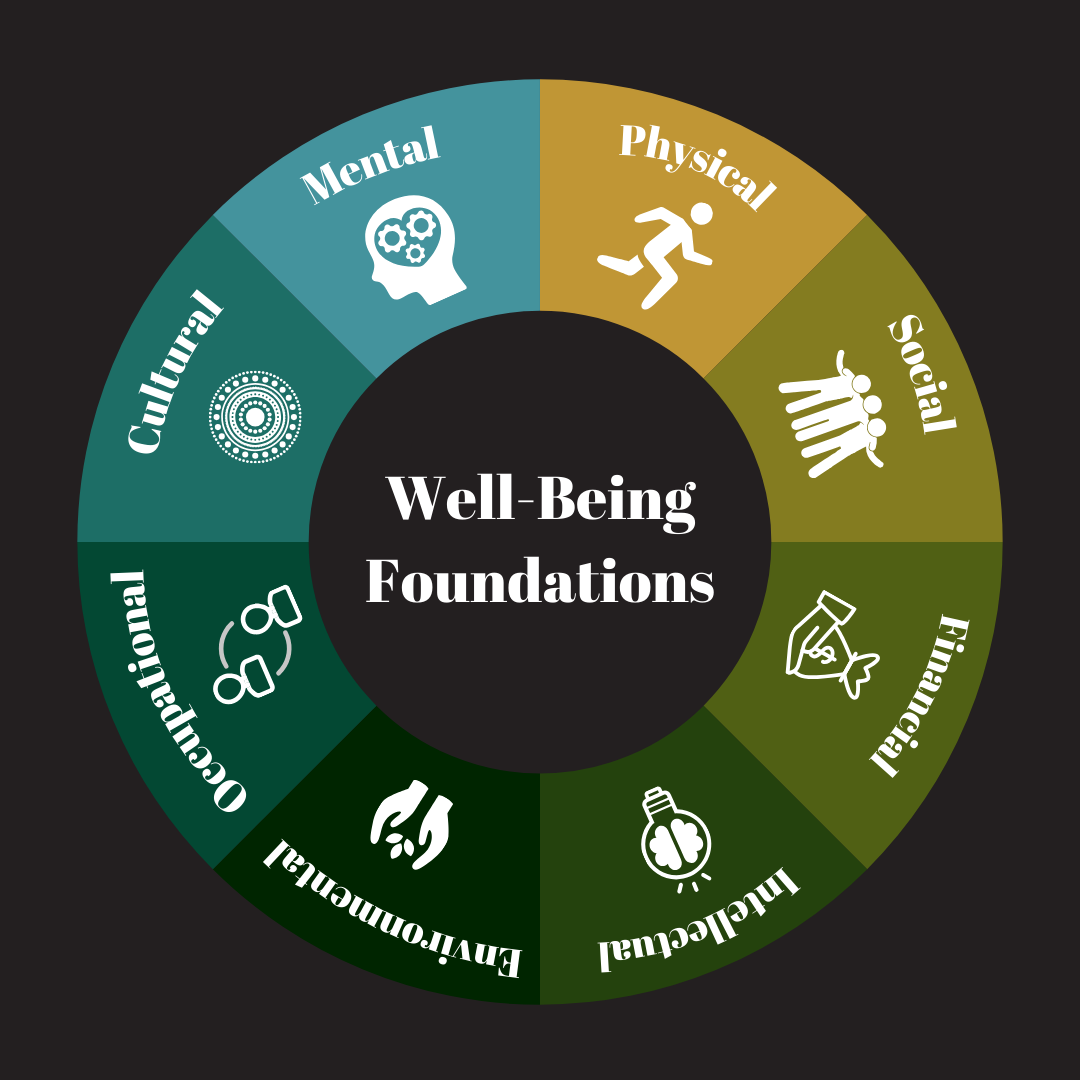
Even when you might be trying to do everything ‘right’ with food, if you are eating based upon rules that don’t fit your cultural preference or your budget, there is going to be friction and make any change feel really unenjoyable and unsustainable.
2. Move Your Mindset from Restriction, to Abundance
What do you think of as soon as I say you can’t have carbs, or that chocolate is bad?
Humans do not function well in depletion, so it makes permission an extremely powerful thing when it comes to food (more on that later!).
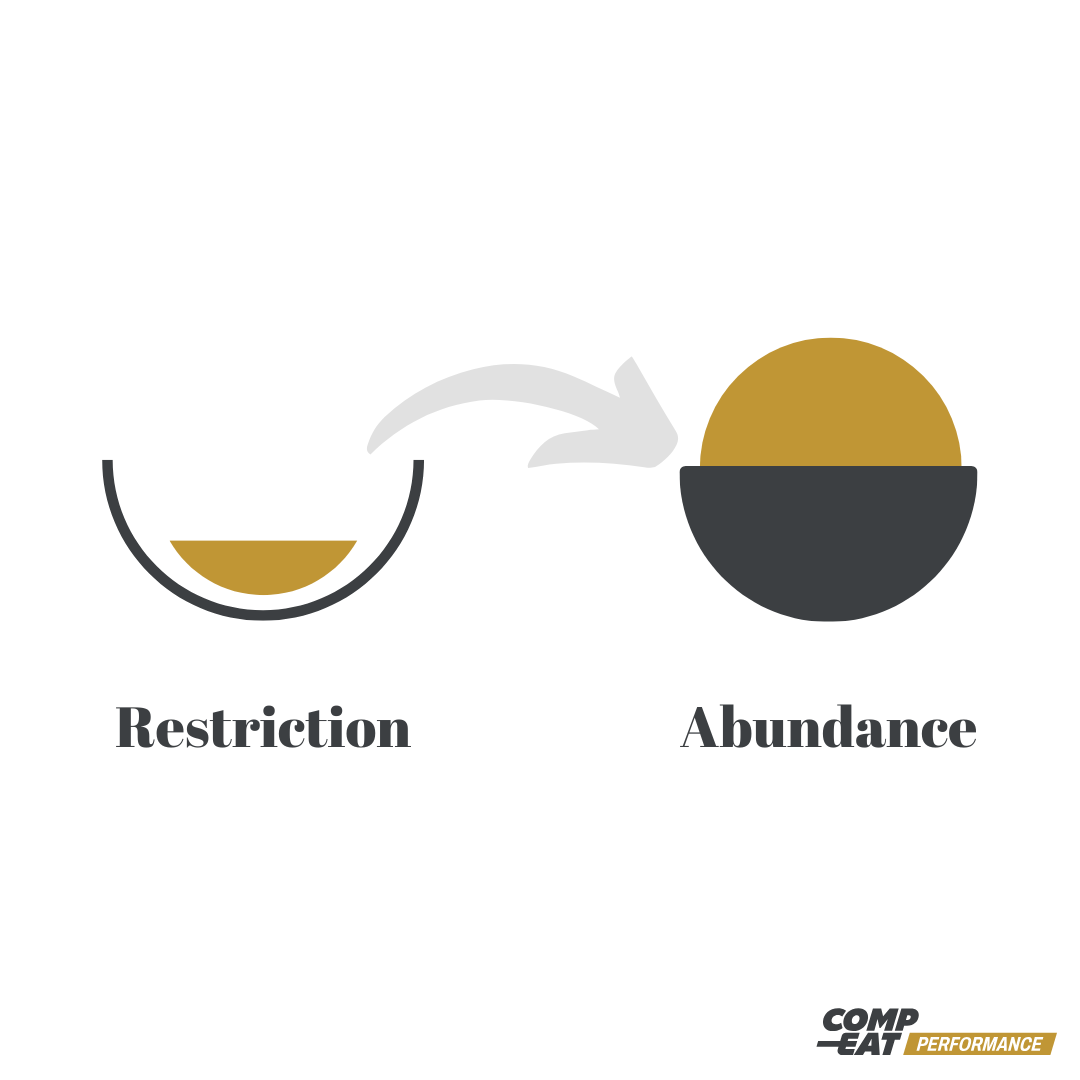
One way to hack this, is to focus instead on what you can ADD IN, what you can have MORE of in your daily food. The abundance mindset.
Can you add more veggies to your dinner plate? Are there veggies or salads to add to your lunch of leftovers? How can you add protein to your breakfast? Should you add a snack in over the morning to make your afternoons more productive?
3. Make Sure You’re Eating Enough
We live in a world that’s constantly telling us to eat less. But have you experienced the ravishing hanger that leaves you snapping at your loved ones when you’ve unexpectedly missed breakfast? I know I have.
The extended impacts of under-eating can leave you feeling down, irritable and unable to focus or make decisions. You can end up fatigued, no motivation to train, at higher risk of illness and with reduced libido. Over time, you might notice yourself needing to eat less and less each time to to change your weight.
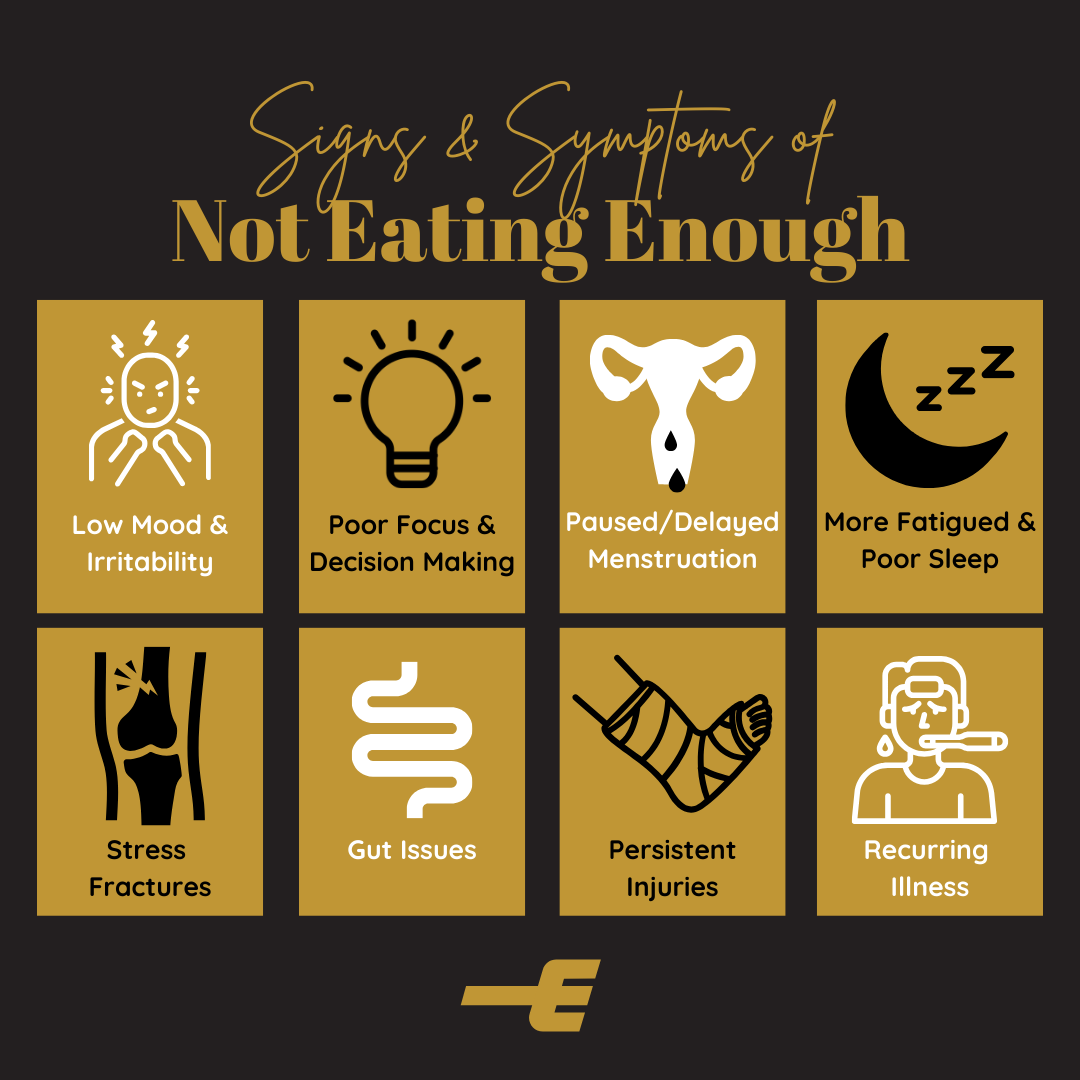
If any of these symptoms are resonating with you, and you’re questioning whether you’re eating enough, then reach out. This is an area our Dietitians specialise in (and we appreciate how vulnerable it can be to even consider eating more!), so if it is resonating, please reach out.
4. Permission to Eat All Foods… Food Holds No Morality
Diet culture is amongst us in every facet of how we consider and count food – including when considering if a food is ‘good’ or ‘bad’. We find ourselves categorising foods in neat boxes, however food is honestly, just food.
Eating a salad doesn’t make you good, or of higher value; just like eating cake doesn’t make you bad or worthy of punishment. Giving yourself full permission to eat all foods sounds crazy (and maybe not something you would expect to hear from a Dietitian!) but allowing yourself to enjoy all foods without attached shame or guilt, allows for incredible progress toward total well-being.
It means reframing food to ‘I shouldn’t have that cake’ to ‘I can absolutely have that cake, but is it what I want and need right now?’
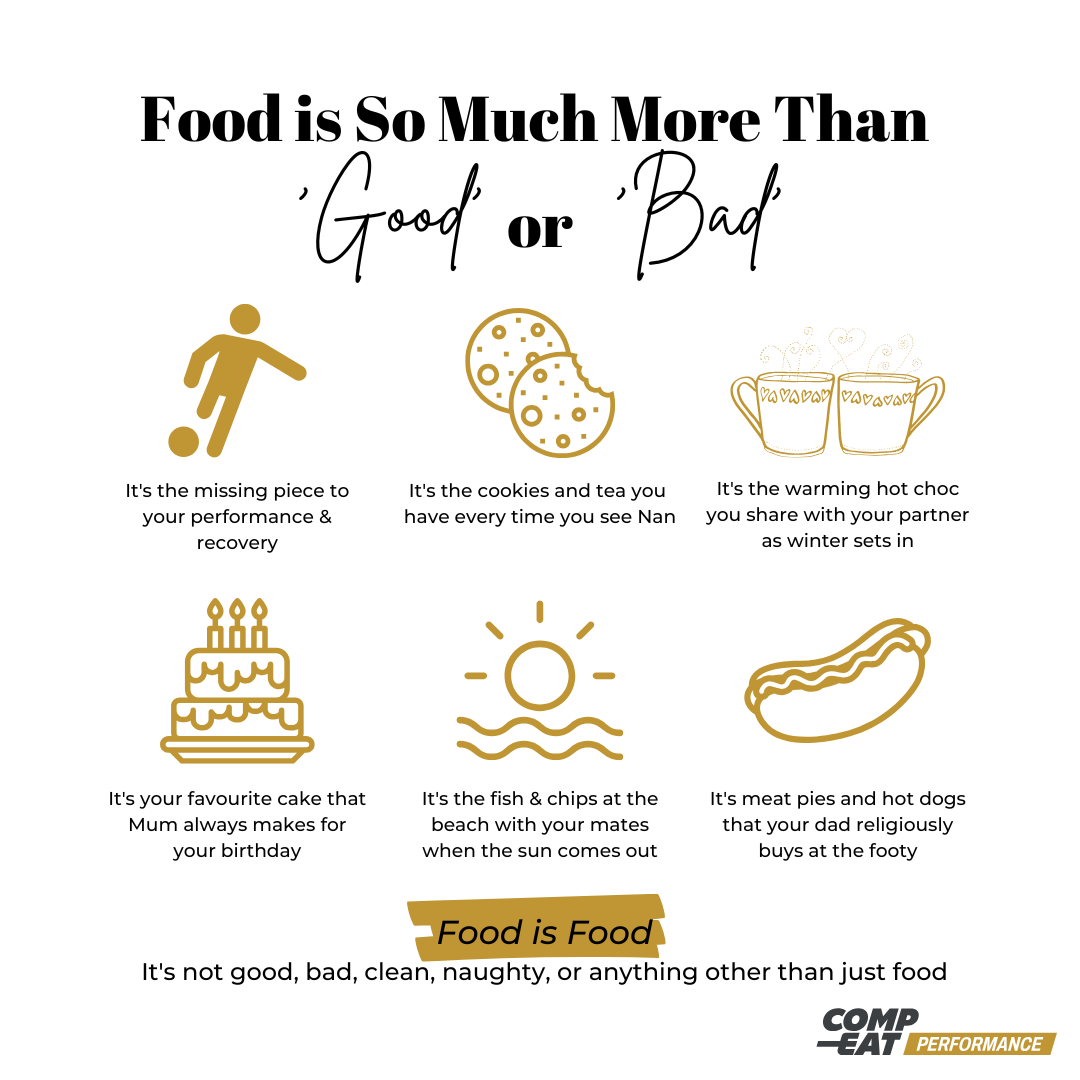
The answer to this question may be a big YES, and in that case – go for it. Enjoy it mindfully and with presence. Take time to take in your surroundings, the social occasion, the taste, the texture and your appetite/fullness cues.
If the answer is no, then that’s ok – you know there will be another cake, another option later. Maybe you will say yes when you are hungry or when at your family birthday.
Either way, you have taken a moment to ask yourself what your food and its purpose is for that moment – and it doesn’t always have to be for nutrients or health, it can also be for memories, celebration, comfort, or performance.
5. Start First with Your Infinite Identity Goal, Rather Than the Outcome Goal
The goals we set tend to be finite and outcome based. They have an end point.
‘Lose 5kg’ or ‘Squat 50kg’ or ‘Run 5km in 25 minutes.’
There is nothing wrong with these goals, but what happens when you reach them (or in many cases, don’t reach them)? We can leave with big feelings like ‘now what’ or the perception that we have failed.
What if we worked backwards and instead considered our bigger ‘why’. What is it you are wanting to achieve through that weight loss? Who is it you hope to become?
It is that who question that is the spark we need to consider our identity goal – how would you finish the sentence ‘I want to be…’?
This goal is infinite, it is forever adapting and progressing, and you may never achieve it (I know I definitely don’t achieve my identity goal of being ‘patient, present and playful’ with my kids every day!).
Once you have your identity goal, then comes the magic. You can now consider what actions this person you are envisaging does each day to be that person. As you start to list those actions, voila – they are the clues toward the daily actions and habits you could start adding into your day at a pace and scale that suits you and where you are right now!
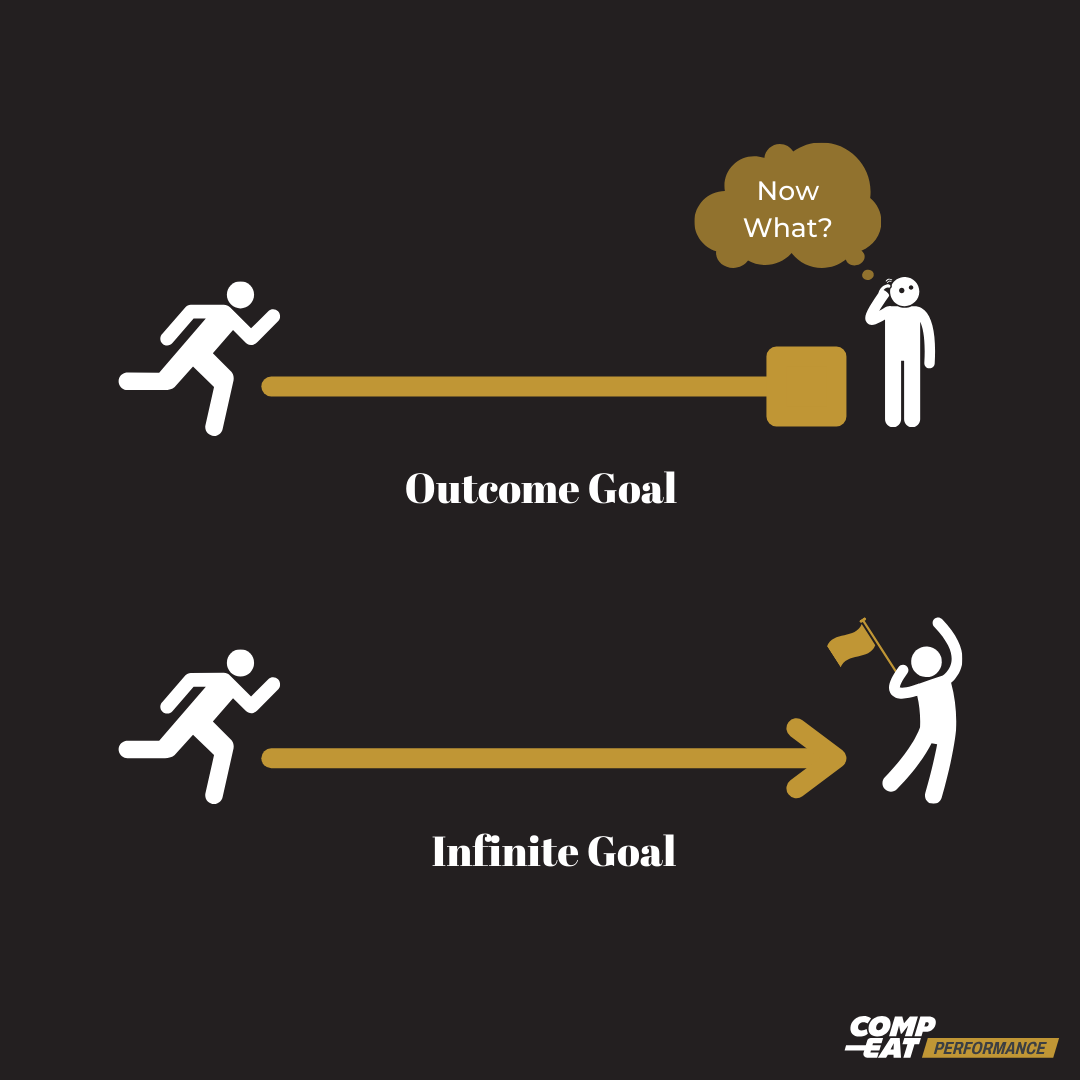
Looking for More Support?
If you’re ready to think about nutrition in a whole new way—one that actually fits you—we’d love to have you on board. As one of our clients said just last week, “I’ve never heard anyone talk about food and nutrition like this!”
Performance looks different for everyone, and our approach is built around your version of success. The best part? We don’t just hand you a plan and send you on your way. When you join us, you get ongoing, unlimited access to your dietitian—so your support evolves with you.
Let’s work together to build confidence, resilience, and a nutrition approach that sticks. Start by completing our FREE Wellbeing Profile today, it will help you identify the areas that may be holding you back from feeling your best!


